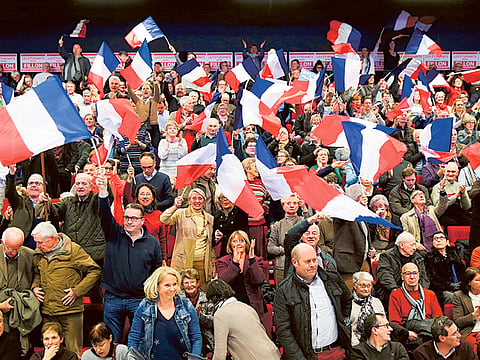European election jitters are masking major risks: Money managers
A sudden rise in the greenback might hurt the country’s exporters and derail the rebound in corporate profits

Paris: Investors have been hedging against the perils emanating from Europe’s elections and may be ignoring other risks that have the potential to roil the current equity-market calm, according to firms including OFI Asset Management, Union Bancaire Privee and NN Investment Partners.
For Jean-Marie Mercadal, who helps oversee €68 billion (Dh265 billion, $73 billion) as chief investment officer at Paris-based OFI Asset Management, the Dutch and French votes will turn out to be non-events. He sees market hazards mostly on the bond side.
“The upside potential on bonds is very limited at this point, but the downside potential is big, and you can lose a lot,” said Mercadal, who favours equities over debt in his current asset allocation.
After reaching historically low levels in July, yields on government bonds started to rally, boosted by improving macroeconomic data and the return of inflation. Rising yields hurt investors holding the debt and raise financing costs for companies.
The debt tumble is probably just starting, and a stronger greenback would pose another risk, according to Union Bancaire Privee’s Michael Lok, who sees the return to growth in the US, Europe and the emerging world as a long-term signal that the global economic crisis of the past 10 years is finally over.
“The danger now is that a sudden rally in bond yields or a spike in the US dollar could be very disruptive for markets,” said Lok, chief investment officer and co-chief executive officer of the asset management unit of Geneva-based UBP, which has 120 billion Swiss francs ($121 billion) in invested assets.
High dollar
A sudden rise in the greenback might hurt the country’s exporters and derail the rebound in corporate profits after last year’s earnings recession. It would also be negative for emerging markets as investors would favour US assets to avoid being exposed to weakening local currencies. The pain could also spread to commodities, priced in dollars, and mining companies.
For NN Investment Partners strategist Patrick Moonen, the peril could come from Washington.
“Markets have high expectations about Trump’s policies and there’s a risk of disappointment in the implementation of these policies, if they’re not as strong as hoped for or if they get delayed by Congress,” he said. His firm oversees €199 billion ($213 billion) and is overweight European equities.
Since Donald Trump won the Nov. 8 presidential election, the S&P 500 Index has jumped 7 per cent, while the Russell 2000 Index of American small caps has climbed 13 per cent, signalling high expectations for a boost in US economic growth. In Europe, the Stoxx 600 Basic Resource Index, which tracks some of the world’s biggest miners, has rallied 20 per cent in the period, more than twice the gain for the benchmark Stoxx Europe 600 Index.
Deutsche Bank AG says it’s China that could be the biggest threat to market stability. The country’s macroeconomic momentum will likely weaken over the coming months, strategists including Thomas Pearce wrote in a note this week. The firm is underweight the European industries that are most sensitive to the Asian nation: capital goods and mining.
Gauge of stress
Last year, concern over China’s growth snowballed, helping send the MSCI All-Country World Index into bear territory in February, while a gauge of stress in the financial markets spiked.
For Anthony Benichou, a cross-assets sales trader at Louis Capital Markets in London, the main risk for markets in 2017 could come from a more hawkish Federal Reserve than currently expected. Investors see a one-in-five chance the central bank will raise borrowing costs at its March meeting, with the odds climbing to about 65 per cent for the June gathering. An acceleration of inflation could prompt the Fed to increase rates faster, which may rein in economic growth and dent investor appetite for risk assets.
“I’m always sceptical about binary risks that are very well flagged,” Benichou said, referring to derivative markets indicating traders are protecting against equity volatility in the run-up to the Dutch and French elections.
Sign up for the Daily Briefing
Get the latest news and updates straight to your inbox



